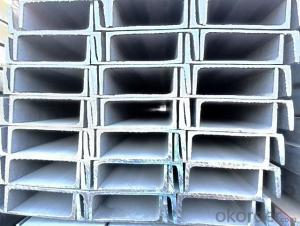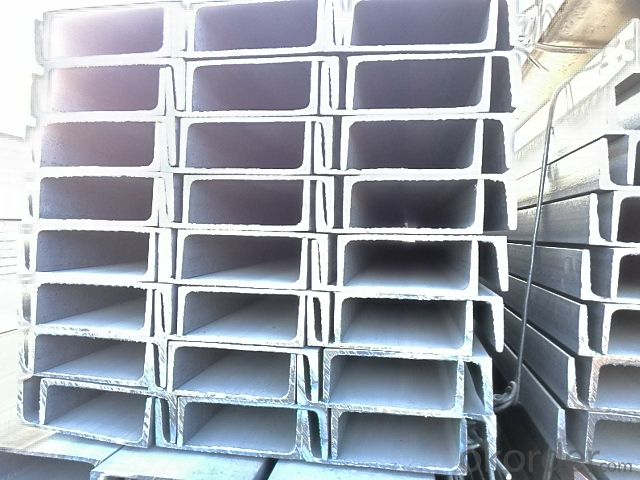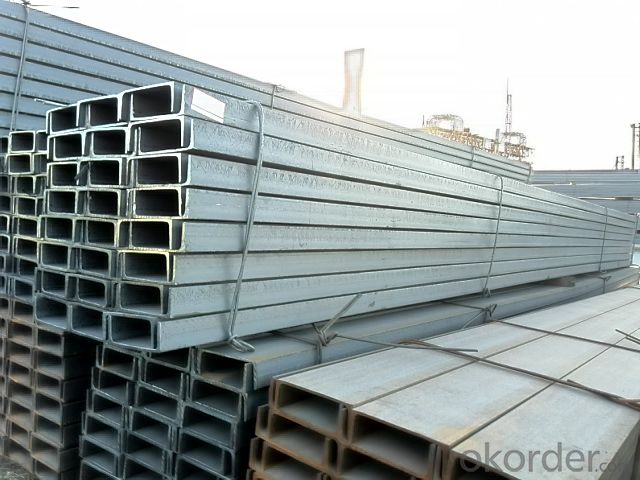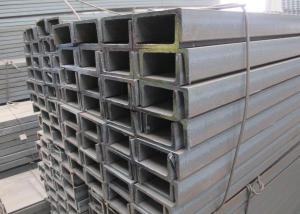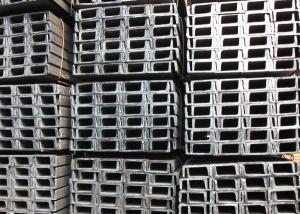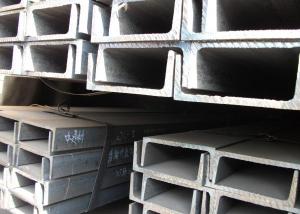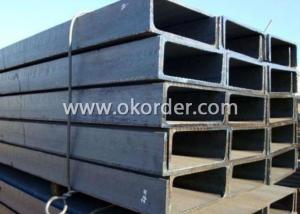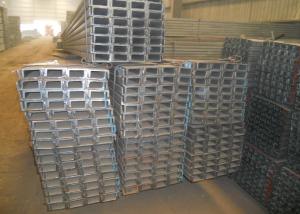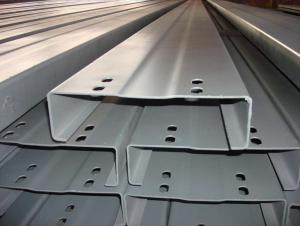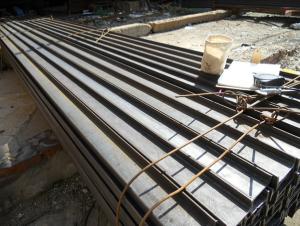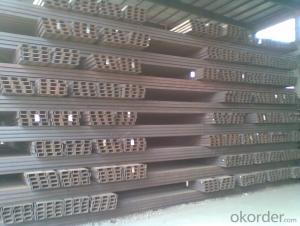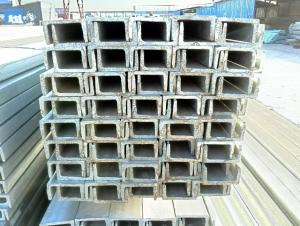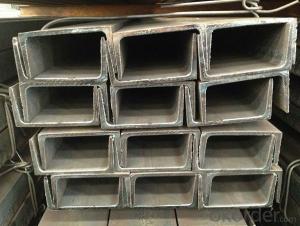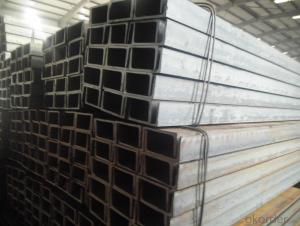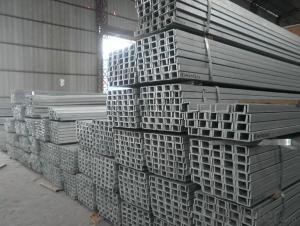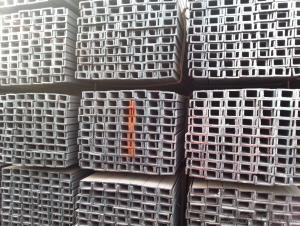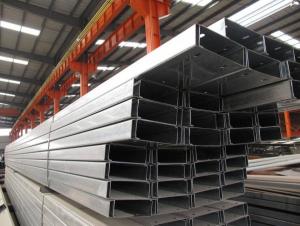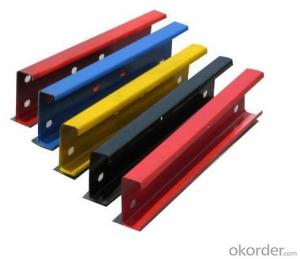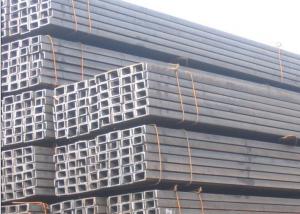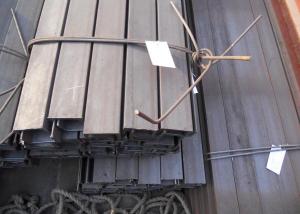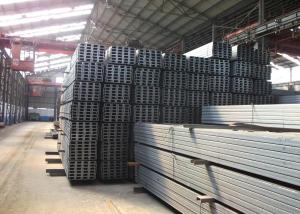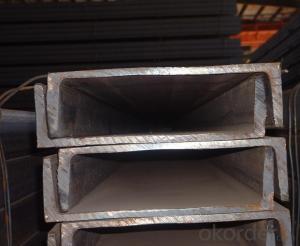JIS U Channels for Structures Buildings Making
- Loading Port:
- Tianjin
- Payment Terms:
- TT OR LC
- Min Order Qty:
- 25 m.t
- Supply Capability:
- 10000 m.t/month
OKorder Service Pledge
OKorder Financial Service
You Might Also Like
Product Description:
| Minimum Order Quantity: | 25MT | Unit: | m.t. | Loading Port: | Xingang Port |
| Supply Ability: | 120000TON/Year | Payment Terms: | TT or LC |
Product Applications:
Japanese Standard U-channels are ideal for structural applications and are widely used in the construction of buildings and bridges, and the manufacturing, petrochemical, and transportation industries.
Product Advantages:
OKorder's Japanese Standard U-channels are durable, strong, and resist corrosion.
Main Product Features:
· Premium quality
· Prompt delivery & seaworthy packing (30 days after receiving deposit)
· Corrosion resistance
· Can be recycled and reused
· Mill test certification
· Professional Service
· Competitive pricing
Product Specifications:
Manufacture: Hot rolled
Grade: Q195 – 235
Certificates: ISO, SGS, BV, CIQ
Length: 6m – 12m, as per customer request
Packaging: Export packing, nude packing, bundled
1. We are definitely speciallizing in manufacturing and supplying channel steel as per japanese standard, which is characterised with high mechanical strength and competitive prices.
Original Place | Tangshan, China | Brand Name | UINDA |
Standard | JIS G3192 : 1990 | ||
Material Grade | SS490 | ||
Sizes | 50mm to 200mm | ||
Sales Volume/Year | 3000MT | ||
Destination Area | Middle East, Africa, Southeast Asia | ||
2. The sections in details are as followings in the table-1
JIS U CHANNEL | Standard | Sectional | Dimension |
| Mass: |
| (mm) | (mm) | (mm) | (mm) |
|
50x25 | 50 | 25 | 3.0 | 6.00 | 2.37 |
75X40 | 75 | 40 | 3.8 | 7.00 | 5.30 |
75X40 | 75 | 40 | 4.0 | 7.00 | 5.60 |
75X40 | 75 | 40 | 4.5 | 7.00 | 5.85 |
75X40 | 75 | 40 | 5.0 | 7.00 | 6.92 |
|
|
|
|
|
|
100X50 | 100 | 50 | 3.8 | 6.00 | 7.30 |
100X50 | 100 | 50 | 4.2 | 6.00 | 8.03 |
100X50 | 100 | 50 | 4.5 | 7.50 | 8.97 |
100X50 | 100 | 50 | 5.0 | 7.50 | 9.36 |
|
|
|
|
|
|
125X65 | 125 | 65 | 5.2 | 6.80 | 11.66 |
125X65 | 125 | 65 | 5.3 | 6.80 | 12.17 |
125X65 | 125 | 65 | 5.5 | 8.00 | 12.91 |
125X65 | 125 | 65 | 6.0 | 8.00 | 13.40 |
|
|
|
|
|
|
150x75 | 150 | 75 | 5.5 | 7.30 | 14.66 |
150x75 | 150 | 75 | 5.7 | 10.00 | 16.71 |
150x75 | 150 | 75 | 6.0 | 10.00 | 17.90 |
150x75 | 150 | 75 | 6.5 | 10.00 | 18.60 |
150x75 | 150 | 75 | 6.5 | 10.00 | 24.00 |
|
|
|
|
|
|
200X80 | 200 | 80 | 7.5 | 11.00 | 24.60 |
Table-1
3. The mechanical property of JIS U Channel Steel in the table-2:
Grade | Yield Strength,N/mm² | Extension Strength N/mm² | |||
Thickness of Steel,mm | |||||
≦16 | >16-≦40 | >40-≦100 | >100 | ||
SS490 | ≧285 | ≧275 | ≧255 | ≧245 | 490-610 |
Table-2
4. The chemical composition of JIS U Channel Steel as per SS490 in the table-3
Grade | Element(%) | |||
C | Mn | P | S | |
SS490 | - | - | ≦0.050 | ≦0.050 |
Table-3
FAQ:
Q1: Why buy Materials & Equipment from OKorder.com?
A1: All products offered byOKorder.com are carefully selected from China's most reliable manufacturing enterprises. Through its ISO certifications, OKorder.com adheres to the highest standards and a commitment to supply chain safety and customer satisfaction.
Q2: How do we guarantee the quality of our products?
A2: We have established an advanced quality management system which conducts strict quality tests at every step, from raw materials to the final product. At the same time, we provide extensive follow-up service assurances as required.
Q3: The products are invoicing on theoritical weight or on actual weight?
A3: We can do it in both manners, according to the customers' request.
Images:
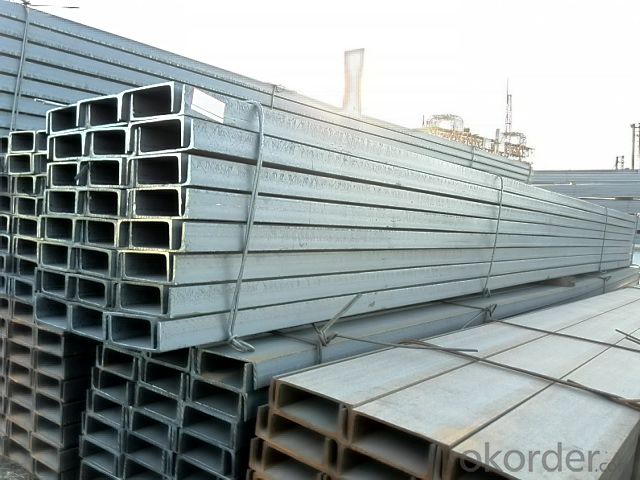
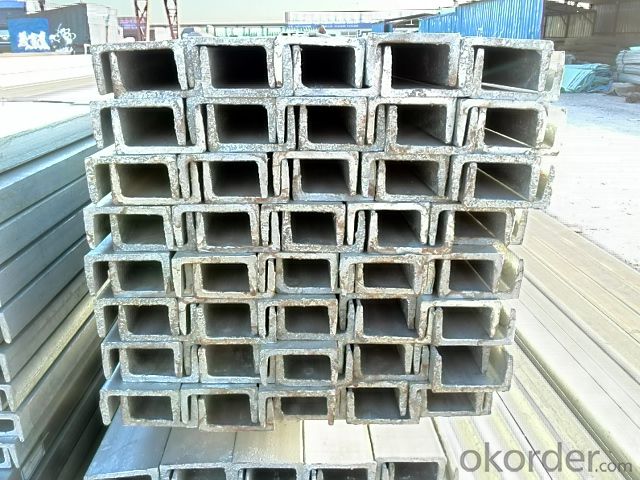
- Q: Channel 10, 1 meters. What is the theoretical weight?
- Channel steel is a strip of steel with a cross section.
- Q: How do steel channels contribute to the overall energy performance of a building?
- Steel channels can contribute to the overall energy performance of a building in several ways. Firstly, steel channels are commonly used as structural elements in a building's framing system. They provide strength and support to the structure, allowing for efficient load distribution and reducing the need for excessive materials. This, in turn, can help to reduce the overall energy consumption during the construction phase. Additionally, steel channels can be utilized in the building envelope, specifically in the insulation and air sealing systems. By properly installing steel channels as part of the framing system, it allows for the effective placement of insulation materials. Proper insulation helps to minimize heat transfer through the walls, roof, and floors, improving the building's energy efficiency and reducing the need for heating and cooling. Moreover, steel channels can contribute to the overall energy performance of a building by providing stability and durability. Steel is known for its high strength-to-weight ratio, which allows for the creation of lighter and more efficient structures. This not only reduces the amount of materials required but also enables the construction of larger window openings. By incorporating larger windows, buildings can maximize natural light and reduce the need for artificial lighting during the day, resulting in energy savings. Furthermore, steel channels can support the installation of renewable energy systems, such as solar panels or wind turbines. These channels can be used to securely mount and position these systems, optimizing their exposure to the sun or wind, which leads to increased energy generation and reduced reliance on conventional energy sources. In summary, steel channels contribute to the overall energy performance of a building by providing structural integrity, enabling efficient insulation and air sealing, facilitating natural lighting, and supporting renewable energy systems. By incorporating steel channels in the design and construction processes, buildings can achieve improved energy efficiency, reduced energy consumption, and ultimately a smaller environmental footprint.
- Q: How much is the weight per square metre of channel 10?!
- Channel 10 weighs just 10 kilograms per metre
- Q: Do you have any width 20 cm wide? What's the model number and how much is it?
- Height of 20 points, two models: 20 channel, height 200, leg width 73, waist thickness of 7, theoretical weight of 22.637 kg per meter; 20a, channel steel, height 200, leg width 75, waist thickness 9, theoretical weight of 25.777 kg.
- Q: How do steel channels contribute to the overall efficiency of a building?
- Steel channels contribute to the overall efficiency of a building in several ways. Firstly, they provide structural support, enhancing the strength and stability of the building. This allows for the construction of taller and larger structures, maximizing the use of space. Additionally, steel channels can be used to create open floor plans, allowing for flexible and versatile layouts. Moreover, steel channels are lightweight yet durable, making them easy to transport and install, reducing construction time and costs. Lastly, steel channels have high resistance to fire, corrosion, and pests, ensuring the long-term durability and safety of the building.
- Q: Do steel channels have any specific magnetic properties?
- Yes, steel channels do have specific magnetic properties. Steel is a ferromagnetic material, which means it can be magnetized and has a strong attraction to magnets. Therefore, steel channels can exhibit magnetic properties and can be used in various applications related to magnetic fields.
- Q: Are steel channels recyclable?
- Yes, steel channels are recyclable. Steel is one of the most recycled materials in the world, and steel channels can be melted down and reused to create new steel products.
- Q: Can steel channels be used for supporting staircases?
- Yes, steel channels can be used for supporting staircases. Steel channels provide structural strength and stability, making them a suitable choice for supporting staircases and ensuring the safety of users.
- Q: Can steel channels be used in overhead crane systems?
- Yes, steel channels can be used in overhead crane systems. Steel channels are commonly used in the construction of overhead crane systems due to their structural integrity and strength. They provide a sturdy support system for the crane's movement along the rails and can withstand the heavy loads typically lifted by overhead cranes. Additionally, steel channels can be easily welded or bolted together to create the required length and configuration for the crane system. Overall, steel channels are a reliable and cost-effective option for overhead crane systems.
- Q: 10kV and below the distribution cabinet in the room, the basic channel should be higher than the indoor ground level? Which specification is clearly defined?
- Power distribution cabinet (box), power distribution cabinet (box) and lighting distribution cabinet (box), measuring cabinet (box), is the last stage equipment of power distribution system. Power distribution cabinet is the general term of motor control center.
Send your message to us
JIS U Channels for Structures Buildings Making
- Loading Port:
- Tianjin
- Payment Terms:
- TT OR LC
- Min Order Qty:
- 25 m.t
- Supply Capability:
- 10000 m.t/month
OKorder Service Pledge
OKorder Financial Service
Similar products
Hot products
Hot Searches
Related keywords
